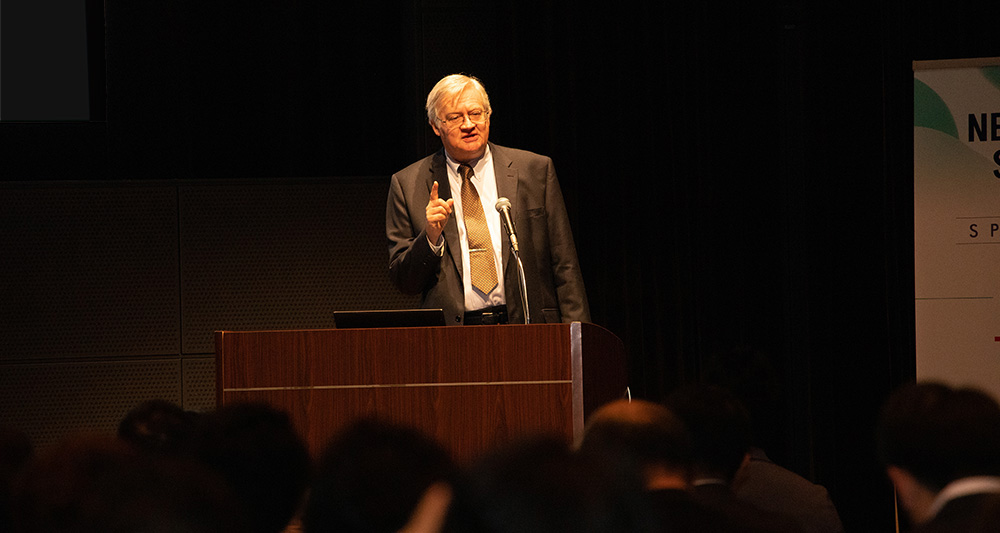February 2024
A Journey of Evolving Potential in Japanese Innovation
Richard Dasher
Director, US-Asia Technology Management Center
Stanford University
March 2024

Richard Dasher is an Adjunct Professor of East-Asian Languages and Culture at Stanford University as well as the long-standing Director of the US-Asia Technology Management Center at Stanford. His research and teaching focus on the flow of people, knowledge and capital in innovation systems, on the impact of new technologies on industry value chains, and on open innovation management.He serves on the advisory boards for national universities and research institutions in Japan, and sits on the selection and review committees of major government funding programs for science, technology and innovation in Canada and Japan. He is an advisor to start-up companies, business accelerators, venture capital firms and nonprofits in Silicon Valley, China, Japan and South Korea.We spoke with Dasher to gain insights into the current state of Japanese innovation as well as the role of government and academia in fostering entrepreneurial innovation.
Japan's Innovation Odyssey
Dasher observes that innovation is a "fundamental aspect of being human…it's always been part of every economy. It is just the nature of the opportunities and the nature of the innovation that require changes as the economy of the country develops." With this in mind, he divides Japan's innovation story into distinct phases: post-war reconstruction, high-growth prominence, and the current pursuit of disruptive innovation.
He challenges the notion that Japan's innovation has become stagnant, recognizing a seismic shift among the younger generation embracing entrepreneurship and established companies fostering collaboration with startups. To this end, Dasher is excited that "innovative people are becoming more involved in entrepreneurial innovation, starting companies and trying new ideas." Looking at regional innovation systems, he continues that "the flow of people, capital and knowledge across different institutions in a region represent a sustainable model that takes advantage of innovation for growth."
In terms of areas where Japan continues to excel and innovate, Dasher spotlights strengths in AI, blockchain and advanced materials. Robotics and content creation, notably anime and games, also contribute to Japan's global influence.
The Japanese Government’s Role in Fostering Innovation
Government policies promoting entrepreneurship and university innovation serve as catalysts in Japan, coupled with the emergence of successful entrepreneurs turning angel investors.
Dasher acknowledges the Japanese government's instrumental role in nurturing innovation. He notes the need to "tip the scales," creating an environment where startups thrive. Government initiatives, including legal and financial infrastructure development and fiscal incentives, can all contribute to this end. Japan also has the advantage of innovating as an advanced economy that already has a high level of average income.Dasher also commends recent partnerships with global accelerators like TechStars, exemplifying Japan's openness to international collaboration. Yet he remains cautious of potential pitfalls, saying, "I am concerned about the system thinking in terms of global success. Sometimes, there may be too much focus on the Japan market. It's very important for the government to recognize where the handoff to the private sector should be."
Academia's Place in the Innovation Ecosystem
Shifting to academia, Dasher observes a transformative shift in mindset within Japanese universities. He argues for a broader approach, urging academic institutions to consider the societal benefits of their research. Collaboration between academia and industry, especially within the startup realm, is thus even more significant. Dasher sees universities contributing financially to startups through venture capital arms, emphasizing the need for diverse voices in innovation.
Dasher's gaze also extends to Japan's response to environmental and demographic challenges. He identifies a heightened societal awareness, viewing climate change and an aging population not as hindrances, but as catalysts for innovative solutions. Japan's reputation for technological prowess aligns seamlessly with its potential to pioneer groundbreaking solutions in response to pressing societal needs.
To this end, he states that "to prepare people for that kind of resilience, in general, not just entrepreneur education programs, but every technical program in Japan should require students to have some sort of basic exposure to business concepts. To solve the problems of the future, the next generation in Japan needs more business knowledge across the board."

Dasher has been researching and analyzing Japanese and U.S. companies for over 30 years
Foreign Investors, Take Note
In a call to foreign investors, Dasher urges venture capitalists to explore Japan's dynamic startup landscape. Strong industries to consider include energy storage technologies, superconducting fiber for energy transmission, grid backup batteries, next-generation automotive solutions, biotech engineering and advanced materials development.
These emerging opportunities signal a shift towards high-growth potential ventures, making now an opportune moment for global investors to engage with Japan's flourishing innovation. Japan still requires considerable infrastructure building to support these ventures before they're truly ready for the global value chain, and foreign investment will be key.
Today, Japanese startups are receiving more support from global organizations than ever in their efforts to spearhead the emerging digital economy. Figures indicate that in 2022, global investment in Japan’s startups surpassed 877 billion yen (approx. 6.7 billion USD), an increase of over 13 times from 64.5 billion yen (approx. 500 million USD) in 2012. In terms of the high rates of growth expected on both sides, Dasher says that there are more "entrepreneurs and seed stage investors who understand that process today. Now is the time to start seriously considering investment in Japan."
Learn More
Contact Us
Investing in Japan
We will do our very best to support your business expansion into and within Japan. Please feel free to contact us via the form below for any inquiries.
Inquiry FormJETRO Worldwide
Our network covers over 50 countries worldwide. You can contact us at one of our local offices near you for consultation.
Worldwide Offices



























